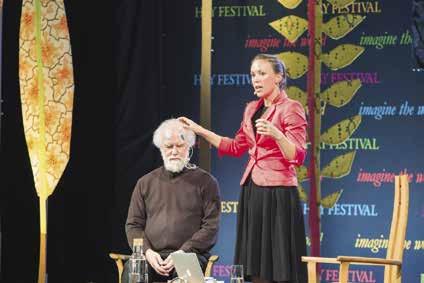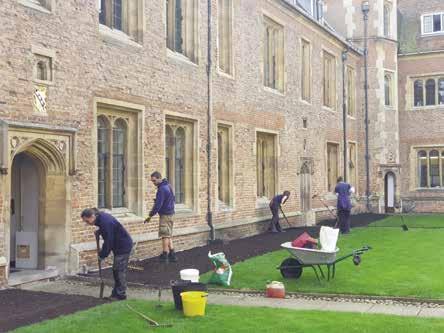
14 minute read
II The Master and Fellows
The Master, among many activities, published Holy Living: The Christian Tradition for Today (Bloomsbury Continuum, 2017) and Being Human: Bodies, Minds, Persons (SPCK Publishing, 2018). In July 2017 he gave the Harold Wilson Lecture at Huddersfield University, the Leslie Newbigin Summer Institute Lecture on the theme of ‘Leslie Newbigin and the Household of God’ at Cripps Court, and the Inaugural Lecture for Biblical Studies at Westminster College; in September he gave a public lecture entitled ‘Theology and Democracy: towards a new political understanding’ at Radboud University, Holland; in December he attended the enthronement of John Davies, Bishop of Swansea and Brecon, as the Archbishop of Wales. In March 2018 he gave the Richard Chartres Lecture (a biennial lecture which focuses on the life of Samuel Pepys) at St Paul’s School, London, and gave the keynote lecture as part of the Edinburgh International Festival of Middle Eastern Spirituality and Peace; in April he gave the Peyton Lectures at Fuller Theological Seminary, Pasadena, California and the Newman Lecture entitled ‘Some Modern Urban Saints – Madeleine Delbrel, Dorothy Day, Maria Skobtosva’ at the University of East Anglia, and received an Honorary Degree from the University of Yale, USA; in May he lectured at Peterborough Cathedral on ‘Peter Peckard and the abolitionist cause’, and took part in several of the Hay Festival events, including a discussion on ‘Landscape and Poetry’ with Simon Armitage for BBC Radio 3, and on ‘What is Consciousness’ with Dr Critchlow; in June he spoke at the Primrose Hill lecture series on ‘A Christian Response to the Refugee Crisis’ and gave the keynote speech at Yale Liturgy Conference.
The President visited Bruges in May to check on the College’s MS of Caxton which was on loan to the Groeningemuseum, and to attend a research meeting. She gave a talk on ‘Pepys and Anatomy’ at Dr Brassett’s conference (see below).
Advertisement
Dr Hyam has retired after 55 years involvement with our Libraries and Archives and has been honoured with the title of Archivist Emeritus ad hominem by the Governing Body.
Professor Boyle has been awarded the Gold Medal by the International Goethe Society. He was given a special lunch in Hall by the Master and Fellows on 30 May to celebrate his 50th anniversary as Fellow (see pp 20-23).
Professor Duffy has published Royal Books & Holy Bones (Bloomsbury Continuum, 2018).
Dr Martin Hughes has published Mediblack (Amazon UK, 2017).
Dr Hadida has been awarded a 2018 University of Cambridge Pilkington Prize for Excellence in Teaching.
Dr Watkins has been promoted to a Readership in History.
Dr du Bois-Pedain has been promoted to a Readership in Law.
Dr Brassett was elected to the Council of the British Association of Clinical Anatomists and appointed an MRCS Examiner for the Royal College of Surgeons of England. She has published The Secret Language of Anatomy (Lotus Publishing, 2017) and gave a talk about it at the Hay Festival in May. She hosted the annual scientific meeting of the British Association of Clinical Anatomists in June.
Dr Waithe has published Thinking through Style: Non-Fiction Prose of the Long Nineteenth Century (Oxford University Press, 2018) with M D Hurley as co-editor, and The Labour of Literature in Britain and France, 1830–1910: Authorial Work Ethics (Palgrave, 2018) with C White as co-editor.
Dr So was a collaborator on the Anti-seismic house in Guangming which won the World Architectural Festival (WAF) World Building of the Year as well as the Architectural Review House Award.
Dr Khaled has been awarded a three-year grant from Breast Cancer Now to investigate unique protein-protein interactions in triple negative breast cancer (TNBC).
Mr Widdows has been appointed Vicar of St Ives with Halsetown, Cornwall, from September 2018 after three years as Chaplain.
Dr Livesey has published From Global to Local the making of things and the end of Globalisation (Profile Books, 2017).
Dr Steele has published Understanding Relations between Scripts: The Aegean Writing Systems (Oxbow Books, 2017).
Professor Raven has published What is the History of the Book (Polity Press, 2018).
Dr Hoye has received the Young Engineer of the Year Award from the Royal Academy of Engineering.
Dr Hone has published Literature and Party Politics at the Accession of Queen Anne (Oxford University Press, 2018).
Dr Coutts has been awarded a five-year grant with the Research Councils UK, Global Challenges Research Fund. The research aims to examine health and healthcare in conflict affected countries.
Mr Makarchev, Donaldson Bye-Fellow, has been awarded the best undergraduate supervisor commendation at the 2018 5th Cambridge Student Union Teaching Awards, and Cambridge’s Rose Book Collecting Prize with his essay entitled: ‘2x2=5: Protests and Experiments in Revolution Era Russian Poetry’.
Mrs Marsh has been appointed to the Board of Trustees of the Hawks’ Charitable Trust.
Dr Critchlow co-presented the last episode on ‘The future of the world’ as part of the BBC’s Tomorrow ‘s World in December 2017. She was a judge on the panel for the Welcome Book Prize 2018. She took part in the Hay Festival with the Master in May and she published Consciousness: A Ladybird Expert Book (Penguin, 2018), reviewed below (pp 101-103).
Honorary Fellows
Professor Sir John Boardman’s 90th birthday was celebrated in October 2017 at a special lecture in his honour in the Ioannou Centre, Oxford.
Mr Gascoigne was appointed CBE in the Queen’s Birthday Honours List 2018.
Sir Christopher Greenwood was made Ordinary Knight Grand Cross of the Order of the British Empire (GBE) for his services to international justice, in the Queens’s Birthday Honours List 2018.
Sir John Gurdon received the Golden Plate Award from the American Academy of Achievement in October 2017 and a Lifetime Achievement Award at the 51st Annual Miami Symposium in January 2018.
Lida Cardozo Kindersley reported that the Cardozo Kindersley Workshop has cut a plaque for Cambridge University commemorating the Borysiewicz Biomedical Sciences Fellowship Programme and Professor Sir Leszek Borysiewic, on his retirement as Vice-Chancellor. Also the workshop has produced an exceptionally large slate plaque recording the donors to the new Kettle’s Yard extension.
PROFESSOR BOYLE’S SPEECH GIVEN ON 30 MAY 2018 TO CELEBRATE HIS 50 YEARS AS FELLOW
This speech has been edited for publication. A full version has been deposited in the College Archives.
My first meeting with a Fellow of Magdalene came in December 1963 and was the occasion when my dream of what the College might be was fulfilled and I fell in love with it for good. I had come on a long coach journey from the Cheltenham bus station to the equally dingy Drummer Street, so that my first impression of Cambridge was not of the grandeur of King’s Parade, but of the dirt-encrusted rear of Christ’s, which, with its railings and window-bars, looked more like the forgotten backside of a mental hospital than a place of learning. I had come for a week of examinations and interviews which in those days determined who got admitted, who got exhibitions – £40 a year – and who got scholarships – £60. The written exams that year took place in the Department of Engineering, which was then still under construction, and were accompanied throughout the week by the sound of nearby pneumatic drills. But between exams I moved from the grubby and noisy mid-20th century to the quiet of Magdalene First Court and the 18th century, if not the Middle Ages. D staircase, where I was housed, had no running water and in the morning a porter brought a basin and a jug of hot water for one to shave. On my first evening, with only
a light or two in First Court, I passed into a pitch-black Second Court where I had been told to make for the only illuminated window, on the first floor of Left Cloister. I passed through the open oak and a green baize door into a cave of light, lined with books from floor to ceiling and amid the lamps and elegant furniture stood a tubby figure with his thumbs in his waistcoat and a watchchain across it, and on his round face a beaming smile of welcome. It could have been Bilbo Baggins, but it was Dick Ladborough, who was to be my Director of Studies and my supervisor in French. Dick could not have been a kinder mentor. If a smile was his welcome, his very last farewell to me was ‘Deo gratias’, the conclusion to a note congratulating me on my appointment to a joint college lectureship with Girton, penned from his bed in the Evelyn Nursing Home, where he died. Dick founded my conception of the College as a haven of study for the benefit of the wider world, the college of C S Lewis, Jack Bennett, and Robert Latham, of Derman Christopherson, Stephen Garrett, and I A Richards. That was not necessarily the view of the College that prevailed among those so unfortunate as not to belong to it. When I first mentioned to my sixth-form French teacher, himself a Clare man, that I was applying to Magdalene, he said, ‘Ah, yes, in my time that was rather a huntin’ shootin’ fishin’ sort of college’. Well, I’m not saying that reputation was entirely groundless. But I was definitely surprised by my second meeting with a Magdalene Fellow, a day or so after my meeting with Dick, a formal interview with the President, Fairfax Scott. His first question to me was reasonable enough – ‘Good school?’ he asked when I named my school, and it was a good question, if you wanted to ferret out brainy troublemakers. His second question however flummoxed me: ‘Do you fish?’ For a moment it seemed as if my sixth-form teacher had been right after all. Fishing to me was something people did in John Buchan, or frogs did in Beatrix Potter. But whatever I said subsequently cannot have been disastrous for on Christmas Eve, with King’s College Carols on the radio, a telegram arrived from Fairfax telling me I had been elected into a scholarship.
No doubt there have always been two sides, or more, to Magdalene. But as an undergraduate I never thought of it as any less a place of true learning than any other college – if anything, it was rather more so, given its remarkable contribution to 20th-century English literature. When I was elected there were only 18 Fellows, and the danger was considerable of having to sit next to one of the older figures with dining rights, whom we knew collectively as ‘the buffers’, and to whom one would have to talk about London clubs or dead bishops. There could therefore be something of a scramble for the company of Simon or Ronald or the Peters, Grubb and Reynolds, or the somewhat older generation from whom one could tease out memories of their wartime experiences, of which they did not normally readily speak: the RAF men, Brian Deakin and Mickey Dias, before the dreadful death of his wife left him less communicative; David Roberts,
an always convivial architect with a famous fire-siren laugh, who had fought his way up the entire length of Italy; even Bernard Saunders sometimes, who once indiscreetly recalled how he had poisoned the water supply of an entire German regiment; and Uberto Limentani, gentle but steely, who said that a professorship was a cure of souls and had survived being torpedoed in mid-Atlantic.
Uberto was my staunch ally when in the early 70s I got myself into trouble by making a suggestion. Although female guests had hitherto been allowed on High Table only once a year, at the annual Ladies’ Night, we thought it might perhaps be possible to let the enemy in a little more frequently, say, once a fortnight, every other Friday, in Full Term. We won and my first guest was the Mistress of Girton, but not before I had been summoned to the Master’s study – Walter Hamilton had after all been the headmaster of Rugby – and told that it was not for so recent an arrival as myself to set about, I quote, ‘turning the world upside down’. With what I now recognise as breathtaking impertinence, I replied that I had been in Magdalene longer than he had. But for all my insolence Walter was very kind to me when my upgrading from a time-limited assistant lectureship seemed to be in doubt and he assured me the College would want to do something for me. For the buffers were human, you see.
But the people who represented the College to me in its purest form and on a daily basis and still do, and to us all, were not Fellows. They were the College Staff, two of whom already impressed themselves on me when I was still taking the scholarship examinations: Andy Suttle, a cook whose style was NAAFI rather than Master Chef, and Leon Cole, who was already using his loud voice and fearsome manner to teach the would-be young gentlemen how to behave.
Tradition tells me that I should say what about the College has changed during my time here, and by now a traditional response to that challenge is to say, of course, the admission of women. But actually I don’t agree with that view. I think becoming a mixed college gave Magdalene back the character it had when I first came here: a friendly, humane, unostentatious sort of a place that quietly kept its considerable distinctions to itself. The roughly twenty years during which other colleges changed around it and it stood out increasingly as involuntarily different from them were an anomaly in its history, and an unhealthy one. Now it is back to where it ought to be: a college like other colleges that is glad to be overlooked so that its members can carry on being nice to one another and can get on with their work. I was delighted the other day when at our Linguists’ Dinner a freshman said to me, quite spontaneously: ‘I like this college. It is understated, it doesn’t show off.’ In what really counts, Magdalene hasn’t changed.
There have of course been big changes, none the less. Employment by the University has become much more demanding. Magdalene therefore, I think, needs to invest much more than it has hitherto done in a solid core of college teaching officers, whose career is with the College and who can secure its
continuity and identity by a commitment to it that is increasingly difficult for those who are also University employees to maintain. Magdalene has in my time been singularly fortunate in having a high proportion of its Fellows who spent their undergraduate days here but our sense of institutional cohesion cannot depend simply on a sort of hereditary principle. Shared memories of course cement affection, but what makes Magdalene precious to all of us is what it is, not what it was. And though, obviously, it would not be Magdalene without its mellowed and ancient buildings and its wandering, unfussy gardens, our affection is commanded in the first place not by what it is, but by who it is, wherever we have arrived from and whatever we do. Magdalene is first and foremost its people: the old from whom we have learnt, the young we have taught, the friends we have made, and with whom we have jointly done our best by the generations who preceded us. Over the last few weeks I have asked myself what are the best things I have done for Magdalene in my fifty years. I have come up with three: first, to have sat on the committee that appointed Denis Murphy as bursar; second, to have begun the negotiations that led to the election of Eamon Duffy as a Fellow; and third, when I was President, and discussing with the Charity Commissioners how the purpose of this foundation should be defined, to have secured a definition not in terms of some utilitarian function that after all might one day be obsolete, but in the simple words which I believe capture our essence: ‘to maintain a college’. We are all here to live and work together for a common academic purpose within the University, bound to one another by fellow feeling and a shared inheritance, and today I thank you all for being Magdalene to me. Please rise and join me in the College toast: Floreat Magdalena. N B
Benson Court in June (photo: Matt Moon)

Edward Cripps (Photo: Matt Moon)
The College is extremely grateful to Honorary Fellow Robert Cripps for the gift of a portrait of his late brother Edward (1951–2009), after whom Edward’s Court on Chesterton Road in named. The Cripps family have been wonderfully generous benefactors to Magdalene over several generations and Edward Cripps, like his brother, was an Honorary Fellow and much-loved member of the Magdalene community. The portrait, which is oil on canvas and will hang in Edward’s Court, was painted by the award-winning New York portrait artist Marvin Mattelson after a photograph of Edward taken at his induction into the University’s Guild of Benefactors by HRH the Duke of Edinburgh in 2001.










